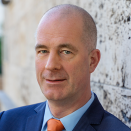Nuclear policy is again high on the political agenda. Countries around the globe seem to be more reliant on nuclear weapons. China and Russia are increasing their nuclear arsenals. New kinds of threats blur the lines among different types of strategic challenges, requiring defense postures to adapt to remain credible.
At the same time, other parties are seeking to reduce reliance on nuclear weapons. First and foremost, the new administration of US President Joe Biden provided interim strategic guidance to take steps to reduce the role of nuclear weapons in its national security strategy and may consider a “Sole Purpose” declaratory policy. In Germany, a heated debate broke out last year when some politicians questioned the future of Germany’s participation in NATO’s nuclear sharing arrangements.
NATO is currently charting a path forward with its NATO 2030 process and nuclear deterrence needs to be part of these discussions. The alliance must ensure that it is capable of countering the various threats of our time while also protecting cohesion among its member states.
Therefore, this panel discussed how NATO’s nuclear deterrence is evolving in light of these developments. How will NATO deal with the continued nuclear threat from adversaries? What role does nuclear deterrence play in countering other strategic and hybrid threats? How important is nuclear sharing for extended deterrence, and how can effective arms control be part of a sound NATO strategy?
A discussion with:
Jessica Cox, Director of Nuclear Policy, NATO
Moritz Kütt, Senior Research Fellow, Institute for Peace and Security Studies at the University of Hamburg
Bruno Tertrais, Deputy Director, Fondation pour la Recherche Stratégique (FRS)
Brad Roberts, Director of the Center for Global Security Research, Lawrence Livermore National Laboratory; Former US Deputy Assistant Secretary of Defense for Nuclear and Missile Defense Policy
Moderator:
Christian Mölling, Research Director, German Council on Foreign Relations (DGAP)
